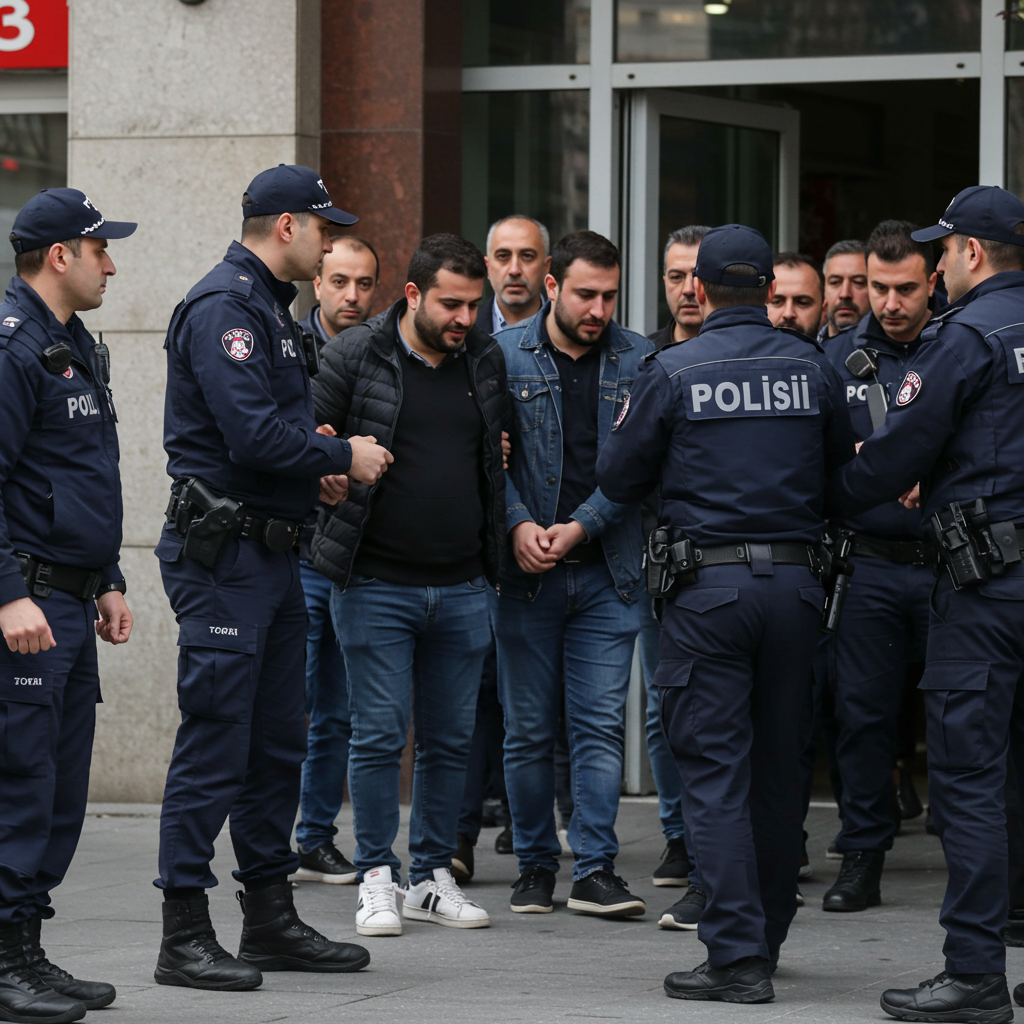Turkish authorities have taken decisive action against employees of a prominent satirical magazine, sparking intense debate over free expression and religious sensitivity. Police in Turkey detained multiple staff members from the weekly magazine LeMan following the publication of a controversial cartoon. This move comes amid accusations the drawing depicts the Prophet Muhammad, a depiction considered forbidden in Islam, leading to charges of “publicly insulting religious values.”
The incident has ignited condemnation from government officials and triggered angry protests outside the magazine’s offices in Istanbul. The detentions and subsequent investigation highlight ongoing tensions surrounding the limits of satire and freedom of expression in a country with a challenging record on press freedom.
Satirical Magazine Faces Backlash Over Controversial Drawing
The contentious black-and-white image appeared in a recent issue of LeMan. It reportedly shows two figures with wings and halos floating in the sky. Beneath them, a scene of conflict unfolds with bombs raining down on a bombed-out city. Reports circulating about the cartoon’s dialogue suggest one figure says, “Salaam Alaikum, I’m Muhammad,” and the other replies, “Peace be upon you, I’m Musa.”
Interpretations of the drawing vary widely. Government officials and some media outlets quickly asserted the figures represented Prophet Muhammad and Prophet Moses. For instance, the pro-government Yeni Safak newspaper described the image as showing “two figures alleged to be Prophet Muhammad and Prophet Moses – with wings and halos – shaking hands in the sky, while a war scene unfolds below.” The independent Birgun newspaper noted some people interpreted the winged characters as Prophets Muhammad and Moses. This interpretation fueled immediate outrage, particularly among conservative and religious groups.
Magazine Defends Intent, Denies Prophet Depiction
LeMan magazine, however, strongly disputes the official interpretation. In a statement, the magazine denied the drawing depicted the Prophet Muhammad. Instead, they insisted the image was intended to portray a Muslim man named Muhammad. The magazine explained the drawing aimed to highlight the immense suffering of Muslims affected by conflict and bombardment.
LeMan’s editor-in-chief, Tuncay Akgun, speaking from Paris, further elaborated on this defense. He stated the figure was fictionalized as Muhammad, referencing one of the most common names in the Muslim world. Akgun asserted the character represented a generic Muslim civilian, a victim of Israeli airstrikes. He adamantly denied any intention to depict the Prophet, calling such an interpretation “very malicious.” Akgun stressed that LeMan would never take such a significant risk. While defending their work, the publication did issue an apology to any “well-intentioned readers who feel hurt” by the cartoon. They also called on authorities to investigate what they described as a smear campaign against the magazine.
Government Response and Arrests
The government’s reaction was swift and severe. Authorities launched an investigation into the weekly magazine. The probe focuses on accusations of “publicly insulting religious values,” a charge that carries significant legal weight in Turkey. Justice Minister Yilmaz Tunc publicly announced the investigation. He stated that depictions of the Prophet Muhammad deeply harm religious sensitivities and social harmony. Tunc argued that “No freedom grants the right to make the sacred values of a belief a subject of humour in an ugly way.”
Interior Minister Ali Yerlikaya also condemned the cartoon vehemently. He described it as “vile” and stated those responsible were trying to “sow discord.” Yerlikaya shared videos of the arrests on social media platform X, showing individuals being forcibly taken from their homes with their hands cuffed behind their backs. He vowed that “These shameless people will be held accountable before the law.”
Police action began with the detention of the cartoonist, identified as Dogan Pehlevan, on Monday. Overnight, the scope of the detentions widened. Three more employees were taken into custody: Editor-in-Chief Zafer Aknar, graphic designer Cebrail Okcu, and manager Ali Yavuz. The state-run Anadolu Agency reported these detentions. Additionally, detention warrants were issued for two editors believed to be currently outside of Turkey. Turkish police also reportedly raided LeMan’s offices located on İstanbul’s İstiklal Avenue.
Protests and Broader Implications
The controversy rapidly spilled into public demonstrations. Overnight on Monday, protesters gathered outside LeMan’s headquarters in central Istanbul. Demonstrators reportedly belonging to an Islamic group hurled rocks at the building and scuffled with police. Some reports indicated the crowd grew to several hundred people. Riot police were deployed, using rubber bullets and tear gas to disperse the crowd during the clashes. Protesters reportedly chanted slogans demanding revenge.
LeMan’s editorial board characterized the legal action and backlash as a “carefully orchestrated smear campaign.” Editor-in-chief Tuncay Akgun called it an “act of annihilation” orchestrated by ministers. The magazine asserted the cartoon had been deliberately misinterpreted to provoke a reaction.
The incident quickly drew comparisons to the 2015 terrorist attack on the French satirical magazine Charlie Hebdo in Paris. That attack, which killed 12 people, followed Charlie Hebdo’s publication of caricatures lampooning the Prophet Muhammad. LeMan’s editor, Akgun, noted the similarities being drawn and described them as “very intentional and very worrying.” He strongly rejected these comparisons, emphasizing that LeMan’s drawing was not intended as a depiction of the Prophet Muhammad, unlike Charlie Hebdo’s explicit caricatures.
This event underscores the challenging environment for press freedom in Turkey. LeMan, founded in 1991, is known as a bastion of opposition and often takes a critical stance towards the government. Turkey consistently ranks low on international press freedom indices; for example, Reporters Without Borders ranked Turkey 158th out of 180 countries in 2023. The detentions serve as a stark reminder of the legal and social pressures faced by media outlets, particularly those engaged in satire or critical commentary, when addressing sensitive religious or political topics.
Frequently Asked Questions
What was the controversial cartoon in Turkey’s LeMan magazine about?
The cartoon published in Turkey’s LeMan magazine depicted two winged figures floating above a bombed-out city scene. One figure says, “Salaam Alaikum, I’m Muhammad,” and the other replies, “Peace be upon you, I’m Musa.” While government officials and some interpreted this as depicting Prophet Muhammad and Prophet Moses, the magazine stated it was intended to show a Muslim man named Muhammad, a victim of conflict, highlighting the suffering of Muslims.
Why were employees of Turkey’s LeMan magazine arrested?
Turkish authorities arrested several employees of LeMan magazine, including the cartoonist, editor-in-chief, graphic designer, and manager, following the cartoon’s publication. The arrests stem from an official investigation launched under accusations of “publicly insulting religious values.” The government views the cartoon as a prohibited depiction of the Prophet Muhammad that harms religious sensitivities and societal harmony.
How does the LeMan cartoon incident relate to freedom of expression in Turkey?
The incident has sparked a significant debate about freedom of expression in Turkey. LeMan magazine defends its work, denying the alleged depiction and calling the backlash a smear campaign against satire and critical media. Government ministers strongly condemn the cartoon and vow legal action, emphasizing that no freedom justifies insulting religious values. This clash highlights the tightrope walked by media outlets, especially satirical ones like LeMan, operating within Turkey’s challenging press freedom landscape.
The detentions and investigation into LeMan magazine over its recent cartoon highlight the precarious balance between freedom of expression and religious sensitivities in Turkey. As authorities pursue legal action based on charges of “publicly insulting religious values,” the magazine maintains its defense, arguing its work was misinterpreted and intended to highlight human suffering. The incident has drawn international attention and underscores the ongoing challenges faced by media outlets in the region.
Word Count Check: 888



